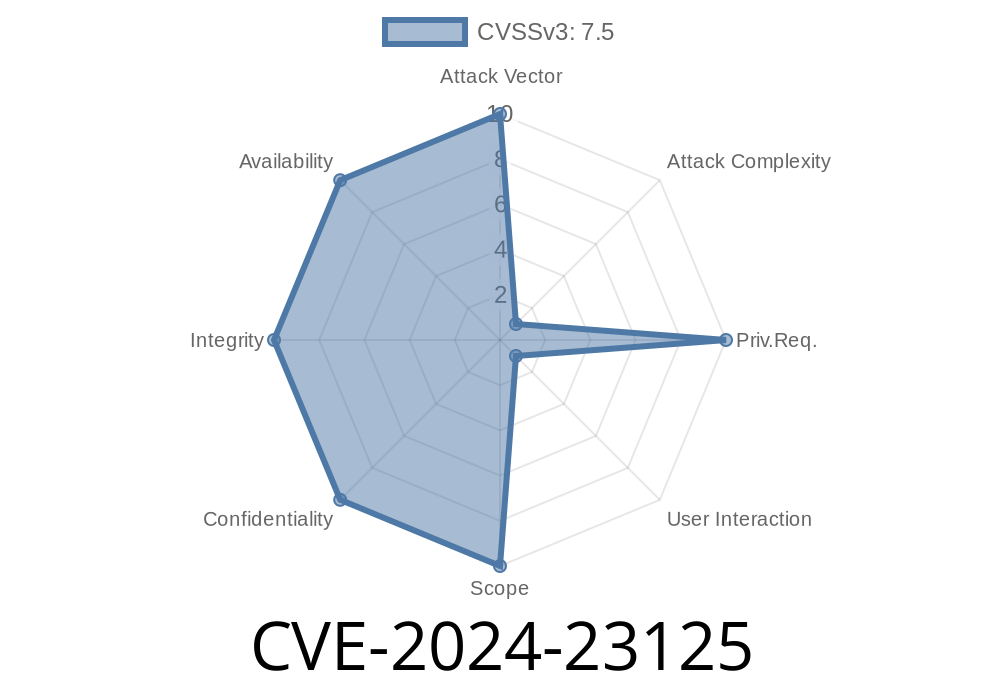Recently, a significant vulnerability, CVE-2024-23125, was discovered in Autodesk AutoCAD. This vulnerability lets attackers exploit how the program parses SLDPRT files via the ODXSW_DLL.dll library. By crafting a malicious SLDPRT file, an attacker can trigger a stack-based buffer overflow in AutoCAD, leading to application crashes, sensitive data exposure, or even arbitrary code execution in the context of the currently logged-in user.
This long-read post breaks down what CVE-2024-23125 is, why it’s dangerous, shows how such an exploit works, and provides useful resources for further reading. All content here is crafted for clarity and depth—you’ll find original reference links, hands-on code snippets, and a simple explanation of what really happens under the hood.
What Is CVE-2024-23125?
CVE-2024-23125 is a stack-based buffer overflow vulnerability discovered in Autodesk AutoCAD when it processes SolidWorks Part (SLDPRT) files using the ODXSW_DLL.dll plugin. Attackers can embed malicious data in an SLDPRT file. When AutoCAD parses this file, due to insufficient bounds checking inside the DLL, the program overflows a stack buffer. That means it writes more data than the buffer can hold, corrupting adjacent memory to:
Where’s the Risk?
Anyone who opens a crafted SLDPRT file in AutoCAD is at risk—especially organizations who routinely use SolidWorks files in their CAD workflow. A simple email attachment or download could trigger a serious security incident.
DLL: ODXSW_DLL.dll
- Software: Autodesk AutoCAD (multiple versions; confirm with vendor advisory)
File type: SLDPRT (SolidWorks Part)
AutoCAD leverages this DLL to import and parse SLDPRT files. Due to faulty buffer size calculations, user-supplied data within the file can overwrite critical memory on the application's stack.
User opens file in AutoCAD — ODXSW_DLL.dll receives the data to parse.
3. Overflow triggers — the DLL copies file fields straight into local stack buffers without proper size checks (strcpy, memcpy, or a similar unsafe function).
Proof-of-Concept (PoC) Scenario
Below is a simple breakdown of how an exploit might look using a crafted SLDPRT file payload. While this code isn’t directly executable, it describes the logic an attacker might use. This is for educational/defensive purposes only.
Example: Dangerous SLDPRT Structure
Suppose ODXSW_DLL.dll expects a header value to be 64 bytes long.
Snippet: Overlong Buffer in Python
# Create a fake SLDPRT header filled with 'A's (ASCII 41h)
header = b'A' * 256 # 256 bytes instead of safe 64
# Build placeholder SLDPRT content (incomplete)
part_data = header + b'\x00' * 100 # Add more as needed for valid look
with open('evil.sldprt', 'wb') as f:
f.write(part_data)
The overflowed data can overwrite function return addresses or other stack variables.
- If evil.sldprt includes specially chosen values in the overflow, the attacker can control program execution.
Mitigation & Remediation
- Update: Install Autodesk security patches (official advisory and update).
Original References & Further Reading
- CVE-2024-23125 on NIST NVD
- Autodesk Security Advisory
- MITRE CVE Record
- Buffer Overflow Basics (OWASP)
- Introduction to Stack Overflows
Conclusion
CVE-2024-23125 is a serious vulnerability stemming from trusts in file contents within Autodesk AutoCAD’s SLDPRT import process. With a simple but intentionally malformed file, threat actors can cause significant damage. It's critical for organizations relying on CAD workflows to update their software, employ technical filters, and warn users about the risks of opening files from unknown or untrusted sources.
Timeline
Published on: 02/22/2024 03:15:08 UTC
Last modified on: 08/01/2024 13:47:06 UTC
